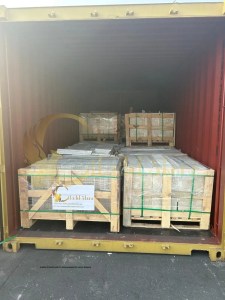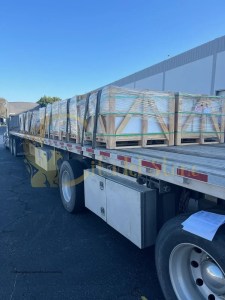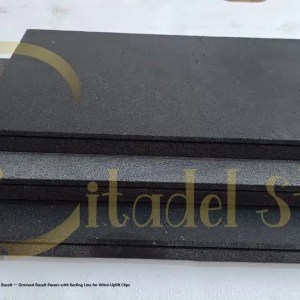Factory capabilities & capacity overview
Citadel Stone’s basalt factory is equipped with advanced machinery and optimized processes to handle both the intricate demands of architectural stone fabrication and the high-volume requirements of industrial basalt production. Our facilities integrate cutting-edge technology with stringent quality control measures to ensure consistent product excellence and operational efficiency. We continuously invest in upgrading our equipment and training our personnel to maintain our commitment to quality basalt manufacturing.
Manufacturing lines
Our architectural manufacturing lines are designed for precision and versatility, capable of transforming raw basalt blocks into a wide array of finished products. This includes sophisticated tile cutting, large-format sawing, and a variety of surface finishing techniques. We utilize automated systems for consistent sizing and superior aesthetic quality.
Crushing & processing lines for industrial aggregate
For industrial applications, our crushing and processing lines are engineered for high throughput and precise gradation control. These lines handle the initial breakdown of raw basalt, followed by multi-stage crushing, screening, and dust control systems to produce various grades of crushed basalt. Our robust infrastructure supports the production of specialized materials for demanding industrial uses.
Our key equipment includes:
- Advanced gang saws and bridge saws for block cutting and slab production
- CNC machining centers for intricate cuts and custom fabrication
- Automated polishing lines for various finishes (honed, polished)
- Flame, brush, polish, hone, and bush-hammering machines for textured surfaces
- Primary, secondary, and tertiary crushers for size reduction
- Vibrating screens and classifiers for precise material separation
- Dust suppression systems and environmental controls
- Conveyor systems for efficient material handling
- Drying kilns (if applicable) for moisture control
Production process — step-by-step
Our production process is a meticulously managed sequence of operations, designed to transform raw basalt from our quarry into finished products of exceptional quality. Each stage is carefully monitored to ensure efficiency, safety, and environmental responsibility, providing full transparency to our buyers.
| Stage | What happens & buyer relevance -| | Quarrying | Extraction of raw basalt blocks from proprietary quarries. This ensures a consistent and high-quality source material, which is crucial for both architectural and industrial products. Buyers can be assured of material traceability from the very beginning.
Product range — architectural & industrial lines
Architectural products
- Tiles: Available in a variety of sizes and finishes for flooring, walls, and cladding.
- Pavers: Ideal for driveways, walkways, patios, and other outdoor applications.
- Slabs: Large-format slabs for countertops, feature walls, and custom furniture.
- Coping: For pools, walls, and other architectural features.
- Bespoke cut-to-size: Custom-fabricated pieces to meet unique project requirements.
Industrial products
- Crushed basalt (graded fractions): For use in concrete, asphalt, and other construction materials.
- Sand/fines: Byproducts of our crushing process, suitable for various industrial uses.
- Feedstock for mineral-wool: High-quality crushed basalt for the production of mineral-wool insulation.
- Refractory aggregate: For use in high-temperature applications.
- Formats: Tiles (12×12, 12×24, 24×24), pavers (various sizes), slabs (up to 48×96), custom sizes.
- Finishes: Honed, polished, flamed, brushed, bush-hammered, sawn.
- Packaging: Crates for tiles and pavers, bundles for slabs, bulk bags for industrial products.
Quality control & testing laboratory
In-house lab capabilities
- Sample testing: Regular sampling and testing of materials throughout the production cycle.
- Sieve analysis: For precise gradation control of crushed basalt, critical for industrial applications.
- Chemical assay: Detailed analysis of basalt’s chemical composition, particularly important for mineral-wool and refractory feedstock.
- Moisture testing: To determine moisture content, ensuring product stability and performance.
- Porosity/water-absorption: Evaluating the material’s resistance to water ingress, vital for outdoor architectural applications.
- Abrasion/resistance: Assessing the durability and wear resistance of finished surfaces.
- COF (Coefficient of Friction): Measuring slip resistance for safety in flooring and paving applications.
- ASTM C373 (Standard Test Method for Water Absorption, Bulk Density, Apparent Porosity, and Apparent Specific Gravity of Fired Whiteware Products)
- ASTM C170 (Standard Test Method for Compressive Strength of Dimension Stone)
- ASTM C241 (Standard Test Method for Abrasion Resistance of Stone Subjected to Foot Traffic)
- Petrographic analysis
- Sieve analyses for aggregate sizing
- LOI (Loss on Ignition) for industrial feedstock
- Request Citadel Stone Technical Data Sheets (TDS) for detailed product specifications.
- Request batch-specific test reports for your ordered material.
- Consider third-party re-testing options for independent verification, if required.
Finishes & fabrication services
Finishes offered
- Honed: A smooth, matte finish that retains the natural color of the basalt without gloss.
- Flamed: A rough, textured finish created by intense heat, providing excellent slip resistance.
- Sawn: A relatively smooth, unpolished finish that shows the marks of the saw blade, offering a natural, rustic appearance.
- Brushed: A soft, worn texture achieved by brushing the stone, enhancing its natural grain.
- Bush-hammered: A coarse, dimpled finish that provides a high degree of slip resistance and a rugged aesthetic.
- Polished: A high-gloss, reflective finish that deepens the color and highlights the inherent beauty of the basalt.
- Edge profiles: A selection of standard and custom edge treatments for tiles, pavers, and slabs.
- Chamfers: Beveled edges for a clean, finished look.
- Bullnose: Rounded edges, commonly used for coping and stair treads.
- Anti-slip treatments: Specialized applications to enhance safety in wet or high-traffic areas.
- Large-format cutting: Precision cutting for oversized panels and custom dimensions.
- CNC routing: Computer Numerical Control machining for intricate designs, precise cut-outs, and complex shapes.
- Precise CNC tolerances for complex architectural elements.
- Custom bevels and mitred edges for seamless installations.
- Ability to produce bespoke shapes and sizes to match unique project specifications.
Industrial-grade processing for mineral-wool & melting feedstock
Why basalt is used in rock-wool
Typical gradations & spec fields industrial buyers request
- Sieve sizes: Precise particle size distribution, often ranging from 0-5mm, 5-10mm, or custom fractions to optimize melting and handling.
- Moisture limits: Low moisture content is crucial to prevent issues during high-temperature processing.
- Chemical assay: Detailed analysis of key oxides such as SiO2, Al2O3, Fe2O3, CaO, MgO, Na2O, K2O, and TiO2, ensuring the basalt meets the required chemical profile for the end product.
- Chemical assay: Request a detailed chemical analysis report.
- LOI (Loss on Ignition): Understand the volatile content of the basalt.
- Moisture content: Verify moisture levels to prevent processing issues.
- Contaminants check: Ensure the absence of undesirable impurities.
- MSDS (Material Safety Data Sheet): For safety and handling information.
Environmental management & sustainability
Emissions control
Packaging, logistics & delivery options
Palletised tile shipping
- Inspection: Thoroughly inspect all packages for visible damage upon arrival.
- Moisture checks: For industrial materials, verify moisture levels, especially if specified.
- Batch matching: Confirm that batch IDs on packaging match order specifications to ensure consistency.

Procurement & specification checklist
- Technical Data Sheets (TDS)
- Material Safety Data Sheets (MSDS)
- Lab reports (batch-specific)
- Sample approval documentation
- Batch ID for traceability
- Packaging manifest
- Warranty terms
- Lead time confirmation
- Incoterm (International Commercial Terms)
- Payment terms
- Storage terms
Certifications, traceability & third-party testing
Chain-of-custody
Basalt Factories in the USA: Domestic Production, Capacity & What Buyers Should Know
Regional Manufacturing Hubs
Basalt factories in the United States cluster near volcanic bedrock regions—primarily the Pacific Northwest—where quarry-to-factory logistics reduce transport costs and enable bigger-format production. Secondary fabrication centers appear near major distribution corridors in the Midwest and West Coast ports, allowing suppliers to serve urban and coastal projects with shorter lead times.
Factory Capabilities & Modern Technologies
Contemporary basalt manufacturing plants combine heavy-duty gang saws and calibrated bridge saws with CNC profiling, waterjet cutting, and thermal flameworks to produce tiles, pavers, architectural cladding, and precision slabs. Many factories now run automated block-yield software to maximize usable stone from each block and integrate closed-loop water reclaim systems to lower freshwater use during cutting operations.
Quality, Sustainability & Specifier Guidance
Top U.S. basalt producers issue mill reports, performance test data (water absorption, freeze-thaw, abrasion), and Environmental Product Declarations to support green builds. For reliability, buyers should verify factory lead-time guarantees, reserve-slab programs, and on-site finishing capabilities. Opportunity areas include factories adding downstream value—such as producing basalt fiber precursor and recycled aggregate blends—which create new revenue streams and improve circularity.
Choosing domestic basalt factories that combine advanced fabrication, documented test data, and strong logistic links delivers predictable supply, better warranty coverage, and simpler certification for construction projects across the United States.

The Role of Basalt Products in Sustainable Landscaping
Metropolitan Grand Hotel — honed basalt tiles & pool coping for a luxury hospitality fit-out
Project brief & challenge: A 30-storey downtown hotel required a durable, elegant floor and pool-edge solution for lobbies, wellness areas and the rooftop pool deck. The owner wanted a dark, uniform basalt that resisted pool chemicals, heavy foot traffic, and frequent cleaning while matching a minimalist design language. Tight delivery windows and complex waterproofing interfaces added schedule pressure.
Citadel Stone role: From schematic design through construction closeout, Citadel Stone partnered with the hotel’s interior architect, the MEP/waterproofing contractors and the main general contractor to select a low-porosity, honed basalt tile and matching prefabricated coping. Citadel supplied full shop drawings (tile layout, cut lists, coping attachment details), product samples for mockups, and chemical-resistance data for the owner’s maintenance team.
Installation & coordination: Citadel coordinated tile deliveries to align with the waterproofing curing schedule, provided on-site training for the tile subcontractor on special adhesives compatible with the pool membrane, and supervised critical edge details where coping met tile and metal flashings. Mockups were used to confirm grout color, joint width and slip performance.
Outcome & benefits: The hotel opened on time with minimal punch-list items. Basalt tiles maintained uniform appearance after six months of heavy use and pool chemistry exposure; coping joints remained watertight. Architect and GC commended Citadel’s proactive submittals and hands-on coordination, which prevented costly rework at waterproofing interfaces.
Riverfront Civic Promenade — heavy-duty basalt pavers and engineered coping
Project brief & challenge: A city expanded a riverfront promenade with continuous pedestrian routes, seating walls and low parapet edges. The design required load-bearing basalt pavers that could tolerate heavy pedestrian flows, occasional service vehicles, freeze-thaw cycles and saltwater splash. Coordination with civil, landscape and structural contractors was essential.
Citadel Stone role: Citadel collaborated with the landscape architect, the city’s civil engineer and the prime contractor to specify interlocking basalt pavers and prefabricated coping with mechanical anchorage. Citadel provided hydraulic and frost-resistance test data, staged mock installations for the city’s review board, and developed detailed jointing and bedding specifications to integrate with subbase drainage and movement joints.
Installation & coordination: Deliveries were sequenced to match subbase compaction and drainage layer installation. Citadel supervised contractor trials for edge restraints and trained the installation crew on compaction tolerances and jointing methods that preserved permeability. They also issued a maintenance plan for municipal crews.
Outcome & benefits: The promenade achieved the desired uniform aesthetic and structural performance; drainage runs remained clear and pavers held tolerances under heavy use. The city praised Citadel’s technical documentation and collaborative problem solving during stormwater tie-ins.
Midtown Office Tower — basalt cladding and rainscreen integration
Project brief & challenge: A high-rise office tower required a premium stone façade using basalt panels with concealed anchors to read as monolithic while meeting strict thermal, wind-load and rainscreen cavity requirements. The architect demanded consistent veining and tight joint widths; the façade contractor needed precise shop drawings and mock panels for approval.
Citadel Stone role: Citadel worked closely with the façade consultant, façade contractor, and the architect to develop prefabricated basalt cladding panels with engineered stainless-steel anchors and thermal separation details. Citadel produced full-scale mockups, wind-load calculations for anchorage, dimensional CNC templates for fabricators, and coordinated acceptance testing with the façade contractor.
Installation & coordination: Panel production was sequenced to façade scaffold availability; Citadel’s site team supervised panel setting tolerances and adjusted anchor lengths on a per-panel basis to account for field variances. They also coordinated with the waterproofing subcontractor to ensure flashing and termination details matched panel layout.
Outcome & benefits: The completed façade delivered the architect’s crisp aesthetic and passed wind-load testing with reserves. The façade contractor reported fewer field adjustments due to Citadel’s tight shop detailing and on-site support, shortening installation time and improving QC.
Regional Airport Apron & Access Roads — crushed basalt for HMA and structural base
Project brief & challenge: An airport rehabilitation required high-quality coarse basalt aggregate for asphalt mixes on aprons and taxi lanes, along with crushed basalt base for access roads and hardstands. The material had to meet strict petrographic, L.A. abrasion and angularity specifications and be supplied reliably to maintain paving schedules.
Citadel Stone role: Citadel adjusted quarry crushing and screening to deliver specified nominal sizes with controlled flakiness and produced certified lab reports (LA abrasion, gradation, specific gravity) for every lot. They coordinated with the asphalt plant and contractor to design aggregate blends that met rutting and compaction requirements and implemented stockpile management to prevent segregation.
Installation & coordination: Timed deliveries matched the plant’s batching windows; Citadel’s field reps provided on-site gradation checks and moisture conditioning advice to the asphalt technician. For base layers, Citadel issued compaction and lift-thickness guidelines to the civil contractor to meet settlement and bearing targets.
Outcome & benefits: Pavement sections achieved design density and rut-resistance targets with fewer compaction passes. The airport authority commended Citadel’s batch traceability and reliable logistics that prevented paving stoppages and kept the airfield schedule intact.
Suburban Residential Village — mixed basalt pavers, coping & interior tiles
Project brief & challenge: A masterplanned residential village called for cohesive basalt finishes across exterior courtyards (pavers and coping) and select interior features (entry lobbies and kitchen worktops). Developers needed a coordinated supply chain to ensure color and finish continuity across product types and trades.
Citadel Stone role: Citadel served as single-source supplier for pavers, custom coping profiles and honed interior tiles. Working with the architect, landscape contractor and multiple builders, Citadel issued coordinated finish schedules, cross-product mockups and provided tolerance matrices so metalwork, timber seating and bedding mortars aligned with stone reveals. They also produced templating services for custom countertops and copings.
Installation & coordination: Citadel provided staged deliveries aligned to builders’ turnover schedules, trained tile and paving crews on jointing and sealing protocols that differed by application, and supplied spare pieces for warranty inventories. They ran combined mockup reviews with the architect and builder prior to full rollout.
Outcome & benefits: The development achieved a visually consistent material palette and fewer post-installation touchups. Builders reported streamlined procurement and fewer RFIs thanks to Citadel’s integrated shop drawings and templating services.
Coastal Port Redevelopment — armor basalt, crushed drainage stone & coping for quay walls
Project brief & challenge: A port redevelopment included quay wall restoration (prefabricated coping and anchor systems), riprap/armor stone for shoreline protection, and crushed drainage stone for subdrainage behind retaining works. The project required marine-grade performance, heavy handling logistics and tight coordination with marine contractors.
Citadel Stone role: Citadel produced large, angular basalt armor units and graded crushed stone for subdrainage, supplied prefabricated copings with marine anchors, and provided geotechnical performance data for design verification. Citadel worked directly with marine engineers, the piling and quay contractor, and the principal construction company to sequence barge deliveries, design bedding mixtures and detail anchor embedment to resist wave uplift.
Installation & coordination: Citadel coordinated lifting and placement protocols with crane and barge operators, staged material on temporary platforms for efficient placement, and issued installation tolerances for coping alignment relative to the quay beam and waterproofing termination. They also performed on-site QA sampling for armor sizing and subdrain permeability.
Outcome & benefits: The quay restored structural integrity and resisted the first seasonal storm events without displacement. The port authority highlighted the project’s minimal downtime during phased operations and Citadel’s expertise in marine logistics and specification compliance.

Templates & downloads
Final Thoughts on Basalt Factory
- Requesting a factory tour: Witness our advanced manufacturing and processing capabilities firsthand.
- Requesting samples: Evaluate the quality and aesthetic appeal of our basalt products for your specific application.
- Downloading our Technical Data Sheets (TDS): Access detailed specifications and performance data.
- Requesting a line-item quote: Obtain competitive pricing for architectural or industrial volumes tailored to your project needs.
































